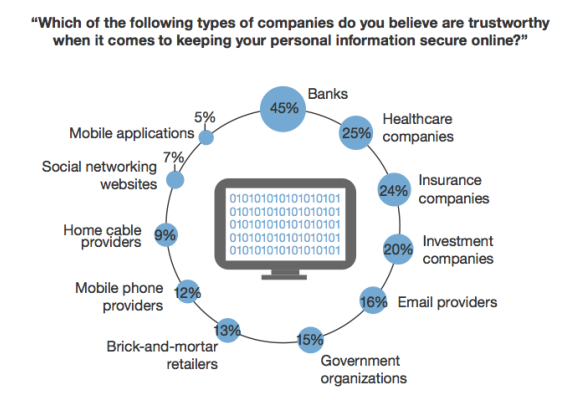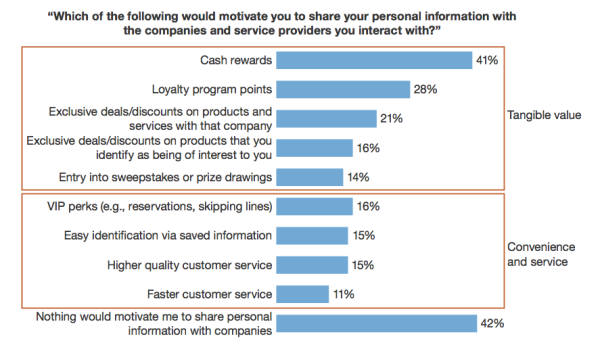Trust Vs. Bribes And The Consumer Privacy Paradox
Survey after survey shows that consumers are wary of marketers and concerned about tracking and privacy. However, they also want more personalization, relevant ads and are happy to divulge personal information when they get something in return. Is this a contradiction, a paradox? It’s really the difference between being confronted with the idea of “tracking” or […]

Is this a contradiction, a paradox? It’s really the difference between being confronted with the idea of “tracking” or targeting in the abstract vs. the often concrete rewards of those processes.
A Forrester survey is the latest published piece of consumer research to capture and reflect this tension. Last year the firm surveyed more than 5,000 US adults about a range of questions, including trust and privacy. One question focused on how much consumers trust different categories of companies.
Source: Forrester
No single response received a greater than 45 percent “yes” response. Banks were the most trusted, while mobile applications (5 percent) were the least trusted. That was followed by “social networking websites” (7 percent).
Despite the widespread lack of trust most consumers are still willing to share copious amounts of personal information under the right circumstances. Cash, points and deals were the top reasons given for being willing to do so, according to the survey. Nonetheless a striking 42 percent said “nothing would motivate me to share personal information with companies.”
The recent NSA domestic spying scandal, combined with regular headlines about hacking and data breaches (e.g., Target), have helped to generate a climate of concern (even fear) about online privacy and security among consumers. There’s no question that consumer concerns are heightened vs. a few years ago.
Source: Forrester
Numerous other surveys from Pew, Accenture and others reflect a similar dynamic: the seeming contradiction between consumer resistance to tracking/targeting and their desire for personalization or acquiescence in the face of clear and tangible rewards.
Much of consumer concern around data privacy comes from uncertainty and a lack of information about how their personal data are being used by publishers, brands and marketers.
The public has become very jaded. It’s now extremely difficult for any brand or publisher to cultivate genuine “trust” among its users. In the absence of that, people do seem willing to be bribed.
Opinions expressed in this article are those of the guest author and not necessarily MarTech. Staff authors are listed here.
Related stories
New on MarTech

